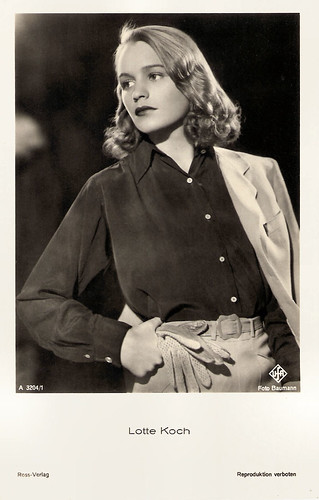German-Belgian actress Lotte Koch (1913-2013) appeared in anti-British propaganda films of the Ufa, but she also starred in Morituri (1948), the first German film about concentration camps and the Holocaust. With Marta Eggerth, she was the longest-living Ufa star, but last May Koch passed away. She was 100.

German postcard by Film-Foto-Verlag, no. G 156, 1941-1944. Photo: Baumann / Ufa.

German postcard by Film-Foto-Verlag, no. A 3733/1, 1937-1938. Photo: Baumann / Ufa.
Lotte Koch was born as Luise Charlotte Koch in Brussels, Belgium in 1913.
After finishing school, she visited the Hochschule für Bühnenkunst (School of Performing Arts) in Dusseldorf, where she studied under Louise Dumont. She received her first theatre engagement in 1931 in Heidelberg.
She was then engaged by the noted Schauspielhaus Zurich (1935-1937), where she played classical heroines as Luise in 'Kabale und Liebe' (Intrigue and Love) by Friedrich Schiller and Helena in Jean Giraudoux's 'Der trojanische Krieg findet nicht statt' (The Trojan war will not take place), both under the direction of Leopold Lindtberg.
In Zürich, she also performed in Klaus and Erika Mann’s cabaret Die Pfeffermühle. In 1936 she made her film debut in the Johann Nepomuk Nestroy adaptation Lumpacivagabundus/Lumpaci the Vagabond (Géza von Bolváry, 1936) with Paul Hörbiger and Heinz Rühmann.

German postcard by Film-Foto-Verlag, no. G 156, 1941-1944. Photo: Baumann / Ufa.

German postcard by Film-Foto-Verlag, no. A 3733/1, 1937-1938. Photo: Baumann / Ufa.
Die Pfeffermühle
Lotte Koch was born as Luise Charlotte Koch in Brussels, Belgium in 1913.
After finishing school, she visited the Hochschule für Bühnenkunst (School of Performing Arts) in Dusseldorf, where she studied under Louise Dumont. She received her first theatre engagement in 1931 in Heidelberg.
She was then engaged by the noted Schauspielhaus Zurich (1935-1937), where she played classical heroines as Luise in 'Kabale und Liebe' (Intrigue and Love) by Friedrich Schiller and Helena in Jean Giraudoux's 'Der trojanische Krieg findet nicht statt' (The Trojan war will not take place), both under the direction of Leopold Lindtberg.
In Zürich, she also performed in Klaus and Erika Mann’s cabaret Die Pfeffermühle. In 1936 she made her film debut in the Johann Nepomuk Nestroy adaptation Lumpacivagabundus/Lumpaci the Vagabond (Géza von Bolváry, 1936) with Paul Hörbiger and Heinz Rühmann.
Then followed a pause in her film career of four years. In the meantime, she played on stage at the Volkstheater Wien (National Theatre Vienna) (1938-1939) and the Hamburger Kammerspiele (Hamburg Kammerspiele).

German postcard by Ross-Verlag, no. A 3325/1, 1941-1944. Photo: Baumann / Ufa.

German postcard by Film-Foto-Verlag, no. A 3568/1, 1941-1944. Photo: Baumann / Ufa.

German postcard by Ross-Verlag, no. A 3204/1, 1941-1944. Photo: Baumann / Ufa.
Morituri
During the Second World War, Lotte Koch regularly appeared in UFA productions, both in leading and supporting roles. She played in the historical melodrama, Das Herz der Königin/The Heart of the Queen (Carl Froelich, 1940) starring Zarah Leander. The film made selective use of the tragic life story of Mary, Queen of Scots and her execution by Queen Elizabeth I for anti-British Propaganda purposes.
Her other films included the drama Friedemann Bach (Traugott Müller, Gustaf Gründgens, 1941) with Gustaf Gründgens as the son of Sebastian Johann Bach, and the anti-British thriller Anschlag auf Baku/Attack on Baku (Fritz Kirchhoff, 1942) starring Willy Fritsch and René Deltgen. In these films, she was often cast as the assistant, a typical cliché role for women in the films of the Third Reich.
After the war, Koch co-starred in the drama … und über uns der Himmel/City of Torment (Josef von Báky, 1947). She played a young war widow opposite Hans Albers as a returning war veteran who has trouble finding work. A special film was Morituri (Eugen York, 1948) in which she played the lead. The story was based in part on the life of producer Artur Brauner. It tells of the escape of Nazi concentration camp prisoners and how they manage to hide and evade recapture, though faced with constant danger and starvation. The film premiered at the Venice Film Festival in 1948. In Germany, Morituri was a commercial disaster, with audiences hissing and booing. A theatre in Hamburg was vandalized, after which other theatre owners, fearful of reprisal by Nazi sympathizers, refused to show the film.
In her last film, the comedy Käpt'n Bay-Bay (Helmut Käutner, 1953) she was again the partner of Hans Albers. In 1953 Lotte Koch finished her film career almost entirely. She worked in television and theatre. In 1971, she did her last screen role in the TV series Motiv Liebe/Motive Love (Hermann Leitner, 1971).
Lotte Koch was married to actor Ernst von Klipstein, who had been her co-star in Das Schwarze Schaf/The Black Sheep (Miroslav Cikán, 1944) and three other films. Later, she married his brother, Dieter von Klipstein. She lived in an elderly home in Unterhaching in the south of Germany. There, Lotte Koch had her 100th birthday on 9 March 2013. She passed away two months later.

German postcard by Film-Foto-Verlag, no. A 3847/1, 1941-1944. Photo: Baumann / Ufa.

German postcard by Film-Foto-Verlag, no. A 3462/1, 1941-1944. Photo: Baumann / Ufa.

German postcard by Das Illustrierte Blatt. Photo: Ufa / Lindner. Publicity still for Das Herz der Königin/Mary Queen of Scots (Carl Froelich, 1940) with Willy Birgel.
Sources: Stephanie D’heil (Steffi-Line - German), Thomas Staedeli (Cyranos), Hanns-Georg Rodek (Die Welt - German), AllMovie (Page now defunct), Wikipedia (German) and IMDb. And thanks to Marlène Pilaete for additional information.
This post was last updated on 29 December 2024.
2 comments:
Such a beauty and 100 years young. How about that!
This is awesome!
Post a Comment